Data Scientists have the power and ability to make or break a business. After all, they look at huge data sets and identify patterns, trends, and anomalies that can help businesses make accurate decisions. If you are wondering how to become a data scientist with the right skills, this article is for you.
In this article, you will learn about what data science is, how to become a data scientist, the typical qualifications, and how data scientists in India have managed so far.
Why Learn Data Science?
Data Science is the science of applying analytical techniques to derive meaningful insights from huge data sets, both structured and unstructured. It facilitates important business decision-making and strategic planning.
A data scientist is an essential asset for any organization, especially when dealing with huge data sets.
From a broader perspective, this is also similar to what a business analyst does. But if you look closely, data science and business analytics are two different concepts.
Business analytics is limited to business decisions, while data science involves generating, managing, and effectively using data for technical and business purposes.
More insights on how these two are different from each other is available here: Data Science vs. Business Analytics.
What to know about data science?
To become a data scientist, there are a few things you must understand:
- Objective: Data science is a scientific way to make decisions by analyzing data rather than working on intuition or ‘gut feeling’. Data science leads to better accountability, transparency, and increased efficiency and effectiveness of business processes.
- Terminology: Data refers to information. It can be structured or unstructured and in any format. Anything that holds information is data. Science refers to understanding phenomena of nature with specific methods. Put together; Data Science means a scientific way of understanding data to create logical processes that provide similar results on experimentation that can be used to better understand the world around you.
- Multi-disciplinary: Data Science is not born out of isolation. It is an amalgamation of multiple disciplines. To be precise, it combines statistics, mathematics, programming, reporting, business understanding, and even storytelling.
Components of Data Science
Multiple components contribute to understanding what data science is.
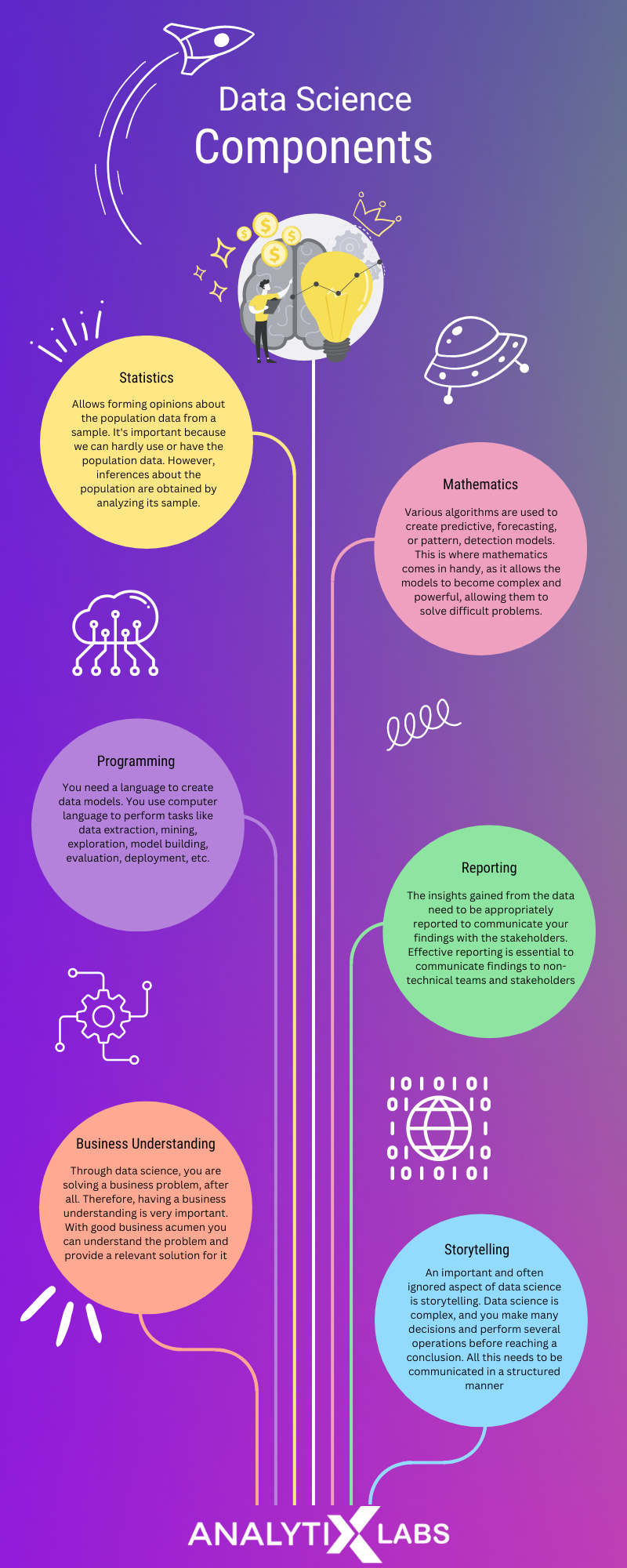
How to Become a Data Scientist: Step-by-Step Guide
Note: This article will majorly cover statistics about Data Scientists in India.‘How to become a data scientist’ is preceded by an understanding of the life cycle of a typical model-building exercise and the tools associated with every step.
Lifecycle of a Model Building Exercise
| Model Building Steps | What it means? | Tools required | |
| Step 01 | Understanding Business Problem | To have a preliminary understanding of the business problem, you require a good business acumen | Tableau and Excel |
| Step 02 | Data Collection | Collecting relevant data to solve the business problem using data science | Programming languages like SQL + Big Data tools |
| Step 03 | Data Understanding |
Once you have the relevant data, you perform data mining and exploration to identify the features of interest. You need to understand the relations that the attributes have with each other. Knowing about statistics is vital at this stage |
R, SAS |
| Step 04 | Data Modeling |
You then start with creating a predictive model. Here knowledge of algorithms and the mathematics behind them is crucial. Programming skills become relevant at this stage when you have to develop the models |
Python and R |
| Step 05 | Model Evaluation | Once model creation is done, you must evaluate and validate the model. Here having an understanding of post-modeling is essential | Tools like R and Python are used to validate models, while for evaluation, Tableau and Excel can be used to understand how the model has performed visually |
| Step 06 | Model Deployment | If everything is considered satisfactory, then the model is to be deployed | Cloud-based tools are essential, and programming skills |
| Step 07 | Iteration | Once you get the results, you need your reporting and storytelling techniques to explain what has happened and the role your model has played | Excel, SQL, and Tableau |
How to become a data scientist: Learning Process
An overview of how to become a data scientist will be:
- Enrol in a data science course
- Complete all projects and thesis
- Prepare for interviews
- Start working as a data scientist and continue upskilling through hands-on learning
Interested in learning Data Science along with career guidance and placement support? Enroll for our Data Science 360 course or signup for a free demo now.
This is a summary of how you can become a data scientist. However, there are many steps included within these broader steps. Becoming a data scientist relies heavily on learning the core concepts of data science and knowing when to apply your learning.
One can learn everything and still fail as a data scientist. Your task is to learn and understand where and how to apply your learning to solve problems real-time. Learn what recuriters are looking while hiring data scientists.
Also Read: Data Science Course Syllabus for Beginners
Here’s a proper order to learn all data science core elements step-by-step.
| What to Learn | Why? |
|
Starting with a spreadsheet helps in gaining an understanding of the data and basic analytical techniques |
|
To better understand datasets and data, warehousing SQL is a must. You can pick MYSQL as the tool, and SQL will also help you when you start with big data later |
|
You have to start programming at some point, and a gentle introduction can be through VBA done in MS Excel |
|
Once introduced to programming, you can take a break and start learning about visualization and creating graphs using tools like Tableau, Power BI, etc. |
|
Statistics is the backbone of data science. You need to start with the statistics theory at this point and to put it to practical use by learning R |
|
You can finally start with Python and perform data manipulation using libraries like NumPy and pandas |
|
Regression, Classification, Segmentation, and Forecasting are the basic problems solved through predictive models. You need to learn about all the relevant algorithms that can solve all such issues. These algorithms include linear regression, logistic regression, decision trees, K-means clustering, ARIMA, etc. |
|
Once familiar with the algorithms mentioned earlier, you can begin with machine learning algorithms like support vector machines, KNN, Random Forest, etc. |
|
You should solve problems with unconventional data, including text, images, audio, video, etc. Here knowledge of deep learning algorithms needs to be gained |
|
Ideally, you should also learn about creating applications to deploy your models. This will include knowledge of Django, Flask, etc. Often models are deployed on the cloud, so it’s the right time to learn about AWS, Azure, and GCP |
|
If you want to enter the field of data engineering and data architecture, getting yourself familiar with big data is a must. You should learn about the fundamentals of big data and HDFS theory and learn tools like MapReduce, Sqoop, Hive, Spark, Kafka, etc. |
Scope for a Data Scientist Professional in 2024
Scope or job opportunities depend on three major factors:
- Demand
- Supply
- Growth
Looking at the current market scenario:
-
Demand
The demand for skilled data scientists is skyrocketing every passing data. Data, without a doubt, is an extremely important commodity for any business. Data is at the core of everything from improving customer experiences to leveraging profit margins and accomplishing strategic objectives.
As a result, data is generated in structured and unstructured forms, which requires handling, analyzing, manipulation, and visual representations.
The demand for data scientists is high. Reports show that from 2012 onwards, data science jobs have increased by almost 650%. Even the covid-19 outbreak couldn’t stall this demand, affecting data science job markets marginally only to pick up within a year of the pandemic.
-
Supply
According to a report published on Community by Nasscom Insights – There is a global shortage of reportedly 1,50,000 to 2,00,000 data scientists. While interested students and professionals are learning data science skills rapidly, the demand vs. supply gap is still huge. This clearly shows that there is no better time to make a career in data science than now – especially when companies are looking for data experts to head their data teams.
-
Growth
The growth trajectory for data science job roles is quite high at the present date. According to the US Bureau of Labor Statistics, Data Scientist jobs will experience a 36% growth until 2031.
Job openings for Data Scientists in India vary across cities. Here’s the job scope in the top 3 tier 1 cities.
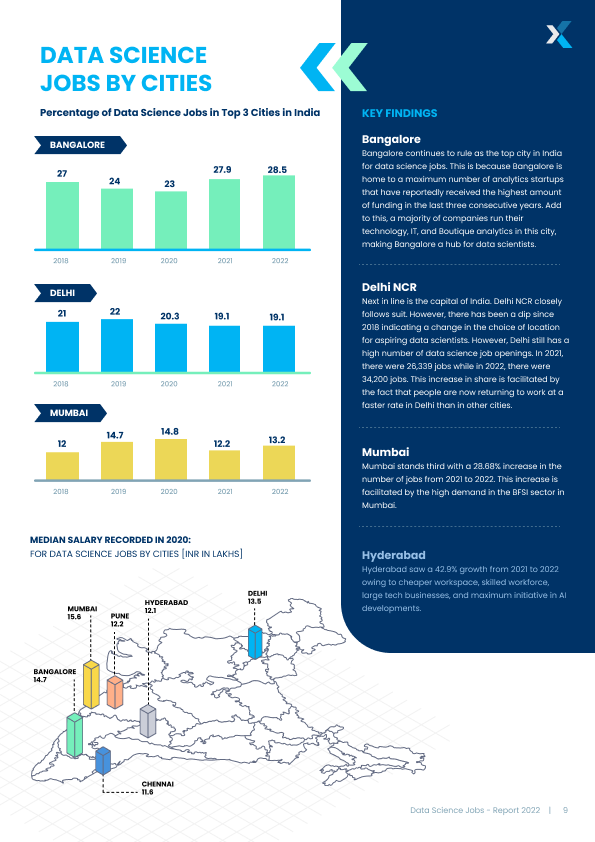
Due to high demand and technical skill set, data scientists will get paid well.
Also Read: Future Scope of Data Science: Career, Jobs, and Skills
This brings us to the next segment: Salary for data scientists.
Salary Range of a Data Scientist
The following data is from December 2022. We will keep updating this section every quarter.Salary by Industry
First, let’s look at the median salary for a Data Scientist in India across industries:
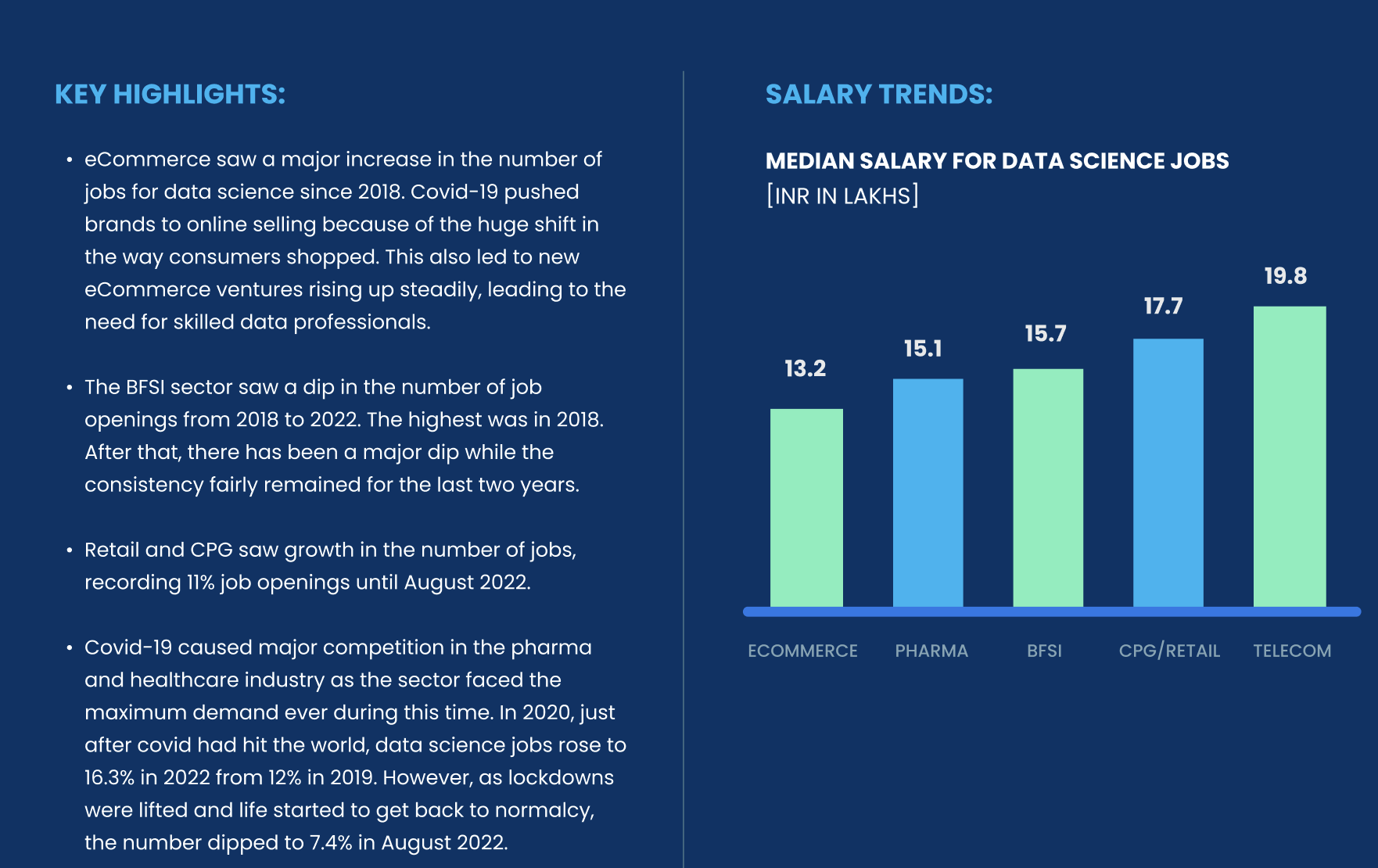
Salary Trends: Tier 1 vs. Tier 2 Cities
- In Tier 1, the average median salary for beginners increased by a whopping 33% from 2019 to 2022. In Tier 2, the same range saw a 28.57% increase in the average salary.
- For more experienced professionals, the salary bracket in Tier 2 went down by 3.76% from 2019 to 2022. In Tier 1, the salary for highly experienced professionals increased by only 3.2%, the least among all experience brackets.
- Maximum salary increase is for less experienced professionals.
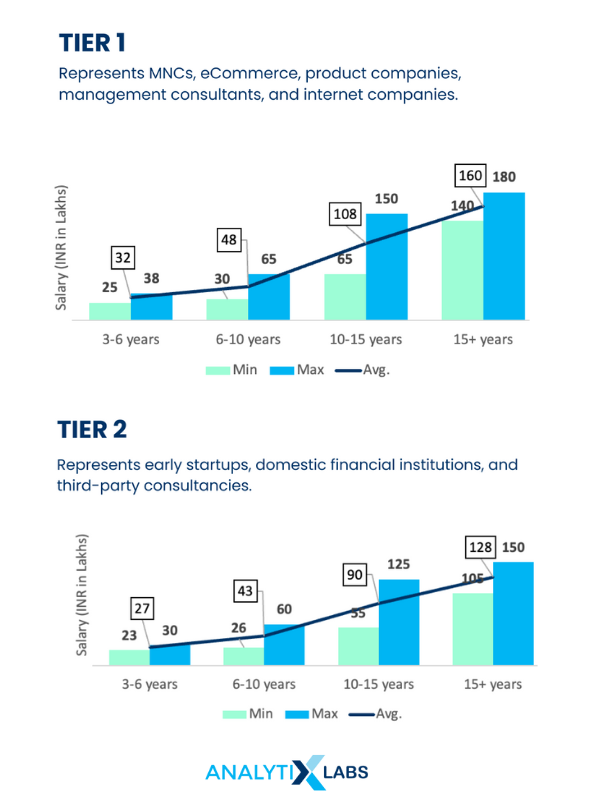
- A salary increment of 20-25% was noticed when switching jobs in the same industry for similar functions in 2019.
- Salary increment for data science roles in 2022 remained between 20-30%.
- Surveys show that men earn more in data science job roles than their counterparts.
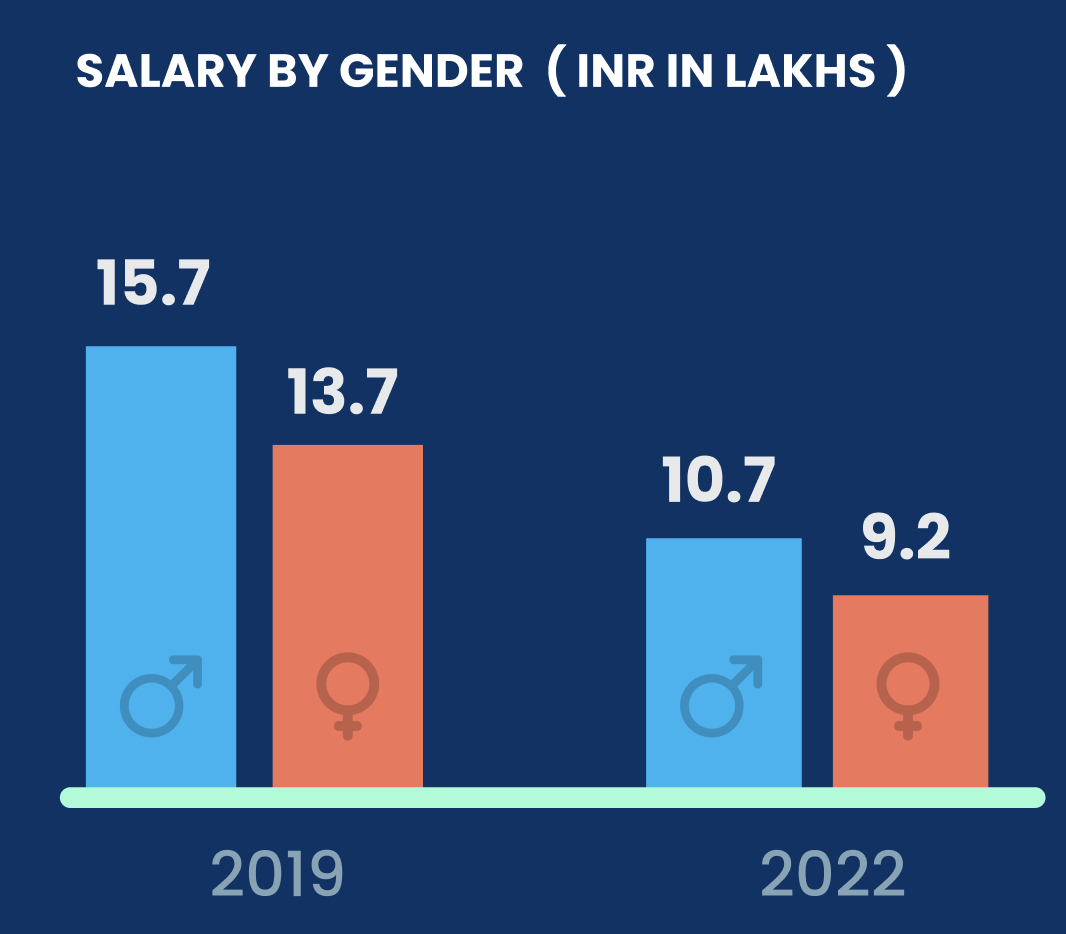
Now that you know the payroll for a data scientist in India, let’s get on with the eligibility to become a data scientist, followed by top skills to acquire .
Eligibility to Become a Data Scientist
There are no stringent eligibility criteria. However, certain degrees and certifications can help you grow as a data scientist.
For instance, Data Scientists commonly earn degrees like –
- Bachelor’s degree in IT, Computer Science, Mathematics, or Business
- Master’s degree in Data Science, Computer Science, or related fields
Similarly, many certifications can add credits to a data scientist’s profile. Some of the top certifications are:
- Certified Analytics Professional (CAP)
- Cloudera Certified Associate (CCA) Data Analyst
- Google Professional Data Analytics Certification
- SAS Certified Data Scientist
Bootcamps
Bootcamps are also helpful to get opportunities as a data scientist. Most bootcamps last around 12 weeks and teach you critical skills for a data scientist. It is possible to get entry-level jobs with a Bootcamp certificate. However, to earn well and grow as a data scientist, it is recommended that you have a master’s degree.
Highly recommended certification: PG Diploma in Data Science
Skills to Become a Data Scientist
> Technical Skills
Data scientists primarily use data to discover patterns and information that can benefit their business or organization. They do this by collecting data from various sources, analyzing it differently, and interpreting the information found in the data.
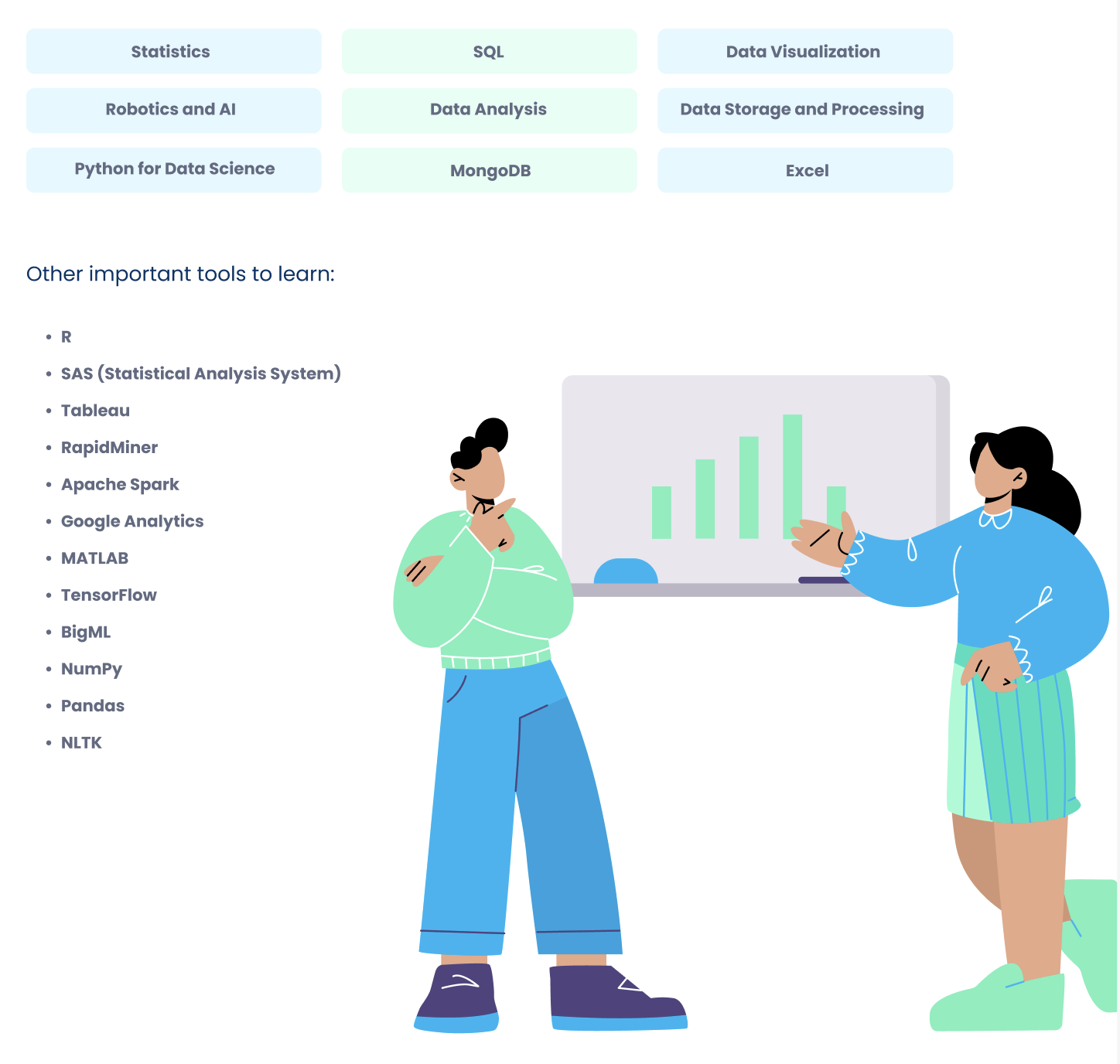
Data scientists require a variety of skills to be successful in their field. For example, data scientists must be able to collect data from various sources and in different formats.
Below are some of the essential skills and tools for your career.
- Statistics
- SQL
- Data Visualization
- Robotics and AI
- Data Analysis
- Data Storage and Processing
- Python for Data Science
- MongoDB
- Excel
Other important tools to learn:
- R
- SAS (Statistical Analysis System)
- Tableau
- RapidMiner
- Apache Spark
- Google Analytics
- MATLAB
- TensorFlow
- BigML
- NumPy
- Pandas
- NLTK
> Non-Technical Skills
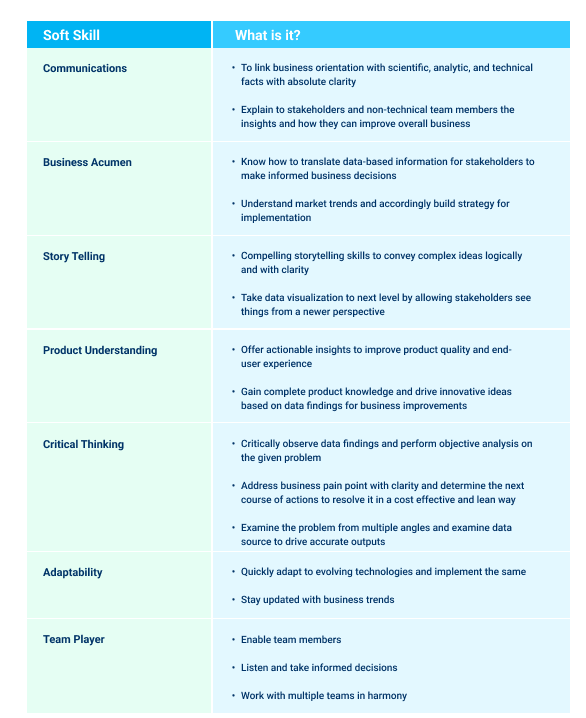
How hard is it to become a data scientist?
It is not extremely difficult to become a data scientist. However, it’s not a cakewalk either. To understand why it’s difficult or what are the difficulties of becoming a data scientist, you have to look at the following aspects-
Mastering multiple disciplines
Data Science is a multidisciplinary field. So, you have to get your hands dirty in multiple fields of study. This includes-
- Descriptive and inferential statistics
- Linear algebra and a bit of calculus
- Common programming languages and programming fundamentals of OOPS, loops, etc.
- Data structures, data types, RDBMS
- Reporting skills of visualization, summary tables, etc
- Business understanding
Strong hold on Theory and Practical
Data Science is neither a purely theoretical nor a practical field, and it’s a bit of both. In terms of theory, you need an excellent memory to remember various algorithms’ workings, advantages, and disadvantages. At the same time, you also need to have the practical skills to implement the models.
Learn a plethora of tools
Another aspect that makes data science difficult is the sheer number of tools you have to master. You need to know different tools for every model development life cycle step. These tools range from programming languages to reporting, visualization, and big data software.
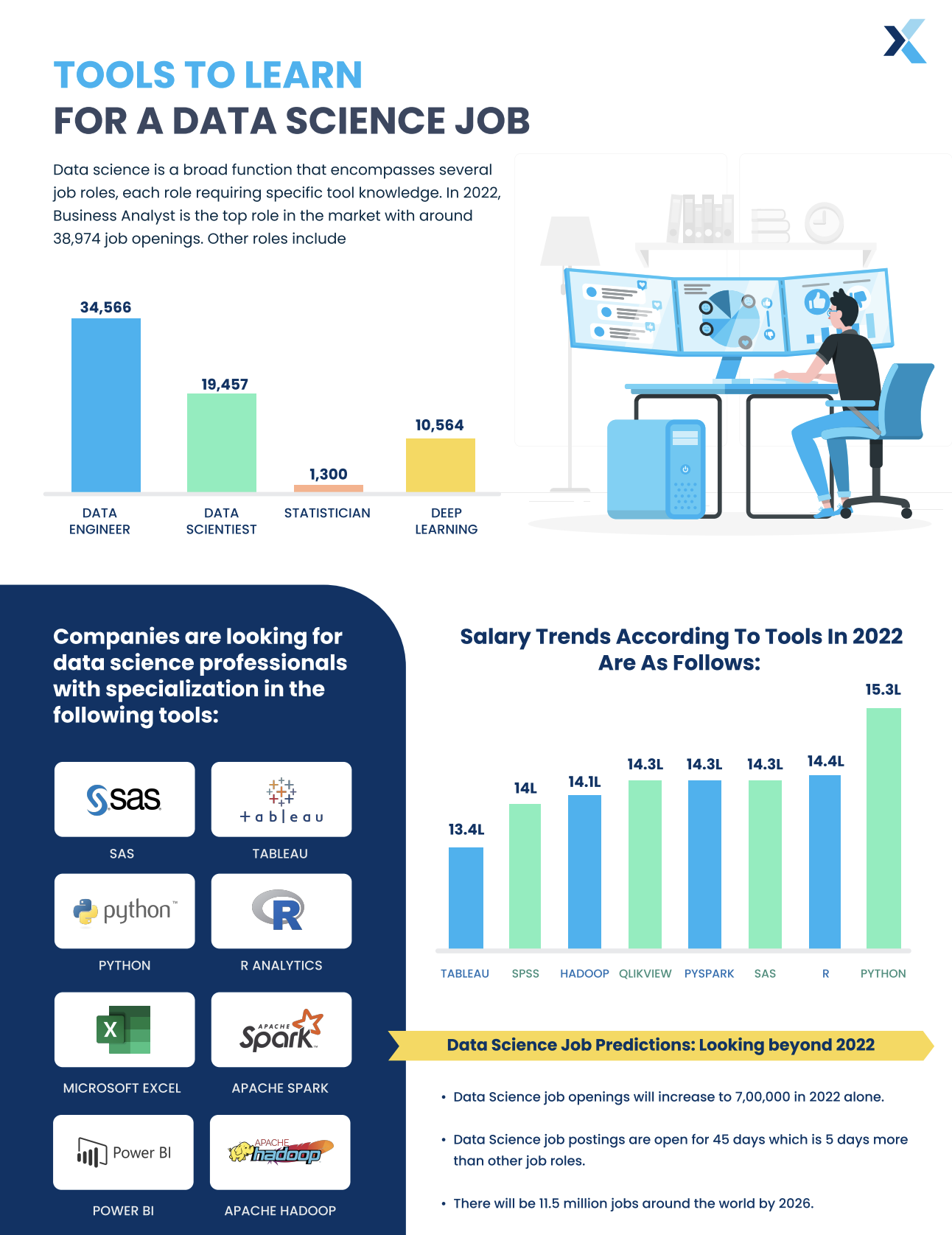
Constant new advancements
Being in a dynamic field, you must be on your toes and learn about the latest advancements. This adds another dimension to the complexity of the learning curve.
You may not have to go in-depth about a particular tool or technique in data science. Still, there is a good amount of breadth that you need to cover. If you have patience and can consistently put in the required time, it’s safe to say that becoming a data scientist is not that difficult.
Best Data Science Courses in 2024
With over 200+ hours of course content, hands-on assignments, and designated courses, you can easily opt for online data science courses. These 7 most sought-after data scientist qualifications courses in 2024 will answer the most asked question i.e. where I can study data science?
Data Sciences 360 Course – Analytixlabs
This program is one of the most extensive courses in Data Science. It begins with basic descriptive analytics using widely used tools like Excel, SQL, and Tableau. And gradually moves to statistical and machine learning modeling using advanced techniques and tools like R and Python. This was rated as India’s top Data course by AIM in the year 2020-21.
- Course Duration: 500 hours / 7 Months
Data Science and Machine Learning with Python – Analytixlabs
This highly coveted training program entails visualization, machine learning, data handling, and statistical modeling. Industry experts provide offline and online classes with coursework that includes hands-on projects.
- Course Duration: 220 hours / 4 Months
Data Science Specialization — JHU (Coursera)
This program balances the breadth and depth of its specialization using the R language. Prior knowledge of programming is required to attend this program, and you need to have a good grip on Algebra, Calculus, and Linear Algebra.
- Course Duration: 11 months
Introduction to Data Science — Metis
Taught by data scientists from top-tier companies, this course covers almost everything that data science entails. Moreover, the instructors offer a flexible time frame for those who require extra attention.
- Course Duration: 6 Weeks
CS109 Data Science — Harvard
This program also manages to strike a balance between application and theory. It is an excellent program for beginners. Although it offers no certification, it is free of any cost.
Course Duration: 13 weeks
Now that the question of “where can I study data science?” has been answered, the next concern is the duration since most data science courses are time intensive and intellectually exhausting.
Although a UG and PG course in data science takes about 2-3 years, you can also learn them in 6-11 months by dedicating 6-7 hours daily to the courses mentioned above.
You may also like to read: Top Data Science Courses & Free Learning Resources
Conclusion
Any industry can benefit from data science, from retail to real estate. These industries can leverage their existing data and weaponize it to their competitive advantage. So, if you are an aspiring data scientist willing to exercise your positional authority to make decisions for corporations, then go for it.
Jokes aside, you will be a key player with that job profile, where you will be the sieve through which structured, semi-structured, and unstructured data will be passed for obtaining insights.
A career in data science is a lucrative option since it reciprocates your intellectual and economic needs. Although challenging, data scientists are in higher demand – likely to explode in the upcoming decade. So, learn with curiosity and retain optimism. Keep working, and the rest will permeate accordingly.
FAQs
- How much do data scientists earn in India?
In India, data scientists’ earnings can depend on their work experience, location, and industry. The median salary for data scientists between the work-ex of 0-3 years is around 5 LPA which increases to about 35 LPA for those with work experience beyond 12 years.
The highest-paying locations for data science are Delhi NCR, Mumbai, and Bengaluru, while e-commerce, banking, insurance, retail, and telecom industries provide the highest median salaries of over 20 LPA.
- What qualifications do you need to be a data scientist?
The typical data scientist qualifications in India include having an MBA or engineering degree in a computer science-related field. Other data scientist qualifications include economics and statistics. Non-STEM and other engineers can also be qualified if they have some data science-related certificates and can satisfactorily showcase their data science skills.
- How long does it take to become a data scientist in India?
The duration of becoming a data scientist can depend on the method you take to become one. For example, if you do a post-graduation in data science, it takes anywhere from one year to two.
Opting for an intensive boot camp-style course provided by online and a few offline training institutes can take anywhere from 4 months to 9 months. If you self-study, the duration will depend on the level of depth you want to go at, but 500 hours of study and 300 hours of practice are the minimum.

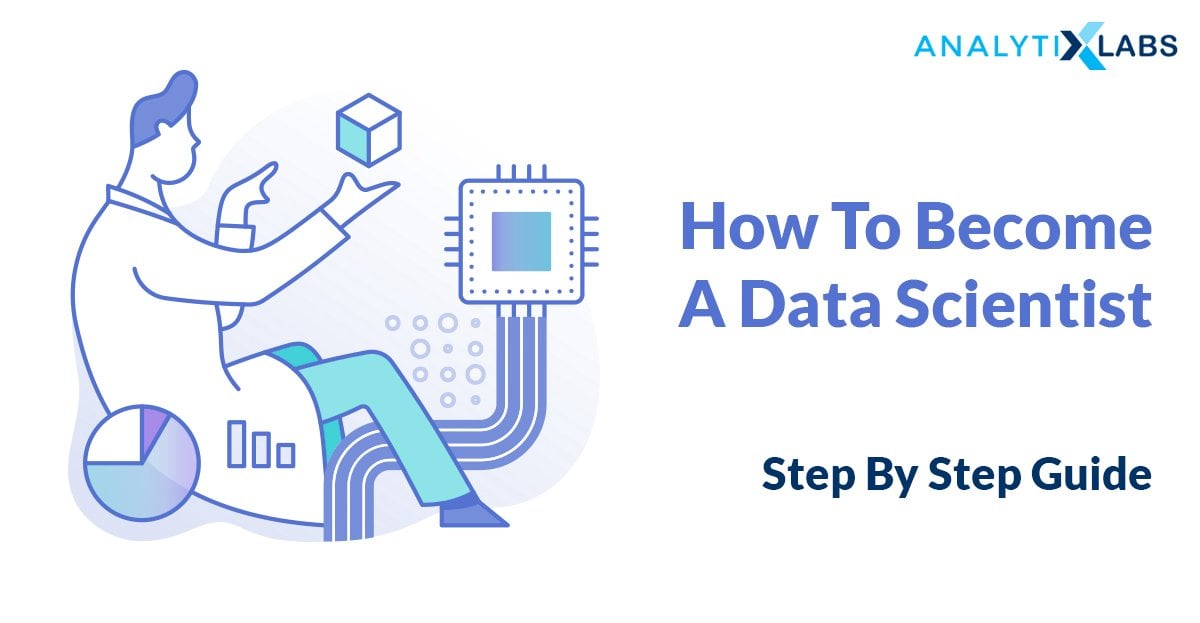



![Tree Traversal in Data Structure Using Python [with Codes] tree traversal in data structure](https://www.analytixlabs.co.in/blog/wp-content/uploads/2025/01/Cover-Image-1-370x245.jpg)



4 Comments
Sir I am now first year eng student with excellent accadamic performance How can I become a Data Scientist in future
Sir i m bsc honours math 2nd year student with optional subject computer science what I have to do after this course to make my future as a data scientist
Hi Sanjana,
Thanks for reaching out to us. To secure a career in Data Science, it will important that you focus on some hands-on skills using tools and techniques that have high demand in the industry. You may try to learn the on your own, or consider a professional Data course science like this one: https://www.analytixlabs.co.in/data-science-specialization-course
Please feel free to call us on +91-9555219007 for more details.
Thank you for sharing the article on data science. It was indeed good piece of information. The detailing in order to learn all data science core elements was very informative. I have been reading a lot lately on data science as i want to persue my career in data science. My friend sugested analytixlabs page to refer for more info, im glad i did.